Have you ever wondered how acupuncture works? The mechanisms are complicated and affect nearly every system in the body. Most of the time, the pain relieving affects and overall feelings of wellbeing are attributed to endorphins and opiates. These pain-relieving chemicals are made by your body in response to acupuncture. What about allergies and the immune system? What role does acupuncture play?
One of the most common reactions in an acupuncture treatment is a histamine response, which often looks like an area of localized redness around the needle. There may be slight swelling, a feeling of warmth, or even itching around the site as well.
Mast cells, a type of immune cell, can be activated by various stimuli. They play a central role in the initiation of the immune response, including the release of histamine. Antihistamines such as Zyrtec work in part, by inhibiting the role of mast cells in allergic reactions.
Research has shown that pro inflammatory chemicals such as histamine are inhibited through acupuncture treatments, in a similar way that Zyrtec inhibits histamine release. The effect appears to be a nonspecific anti-inflammatory effect which may lead to lesser levels of overall inflammation.
The mechanisms of exactly how a needle works to regulate inflammation, allergies and pain in the body is still being researched. Clinically we see the effects of acupuncture on this reaction every day.
The following photos show two patients who had an initial strong histamine response with inflammation which was then regulated by the end of their treatment. We see these responses in patients with issues as diverse as back pain, fertility, digestive complaints and headaches.
Patient A had upper back pain in the area of the red spot.
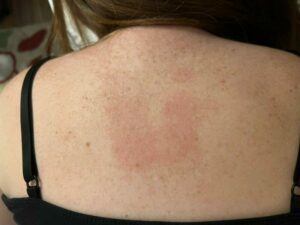
Before Acupuncture. They had upper back pain in the location of the red area.
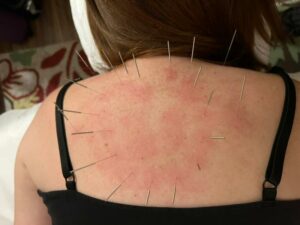
During acupuncture: Notice the redness around the needles.
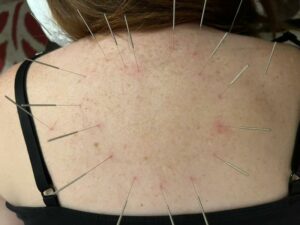
At the end of acupuncture: Redness is nearly gone and she left with no pain.
Patient B had upper back pain
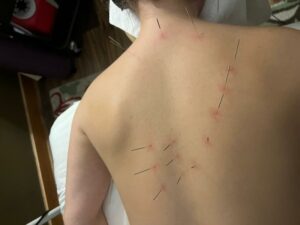
During acupuncture. She had pain in the areas where the needles turned red.
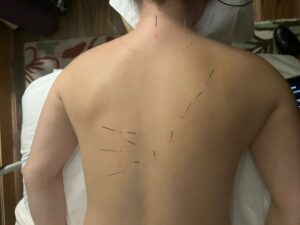
After acupuncture. Redness and pain are gone.
Springtime is a common time for allergies and increased inflammation. Acupuncture, Quercetin, NAC, and Chinese herbs can all help regulate these responses and decrease your symptoms.

Leave A Comment
You must be logged in to post a comment.